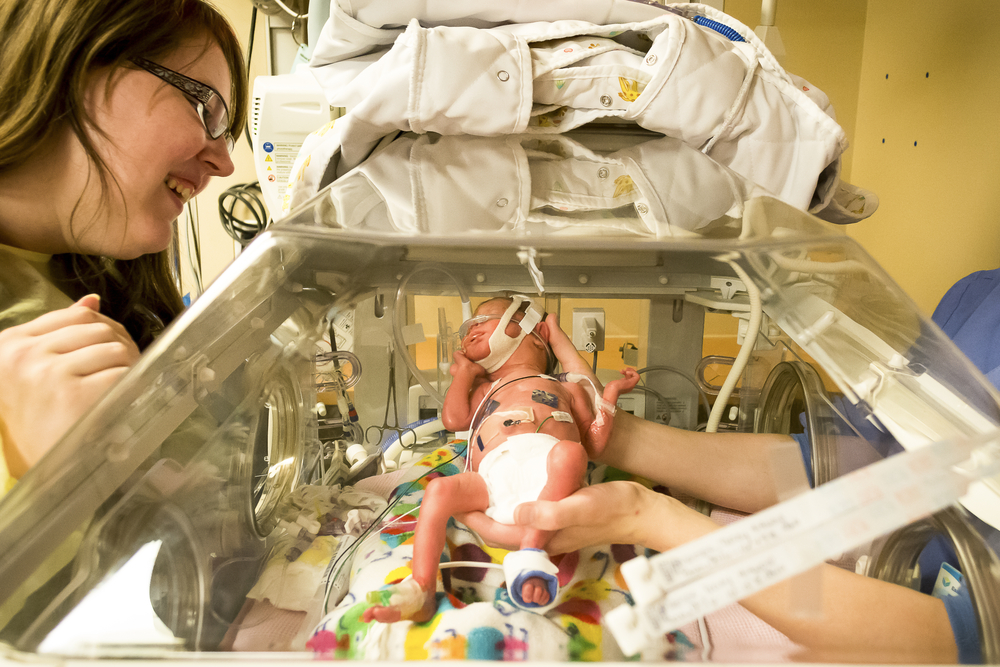You can find Jill Hartman working at her local hospital in Albuquerque, NM. She’s there pursuing one of her passions – to help little ones thrive during their first days of life.
Most babies get handed off to their parents right away after birth, but a few need to have more advanced care. When little ones go to the NICU, they don’t always get a lot of attention during these initial formative days because of their health needs.
Hartman makes sure that the little ones are not left alone. She volunteers in the NICU to sing, read, and hold them to ensure that they feel loved. By taking these steps, she is helping them form connections to the outside world.
Those nurturing connections may give these little ones a fighting chance to live when the odds are stacked against them.
Bonding with Children Creates Development Opportunities
When infants are admitted to the NICU, some parents might not be able to see or hold their baby early on, or even visit as much as they’d like. Factors such as distance, family dynamics, or illness can all require separation to ensure the little one’s physical health stays protected.
That’s when volunteers like Hartman can fill in the gap with Albuquerque’s premature babies. By giving them a place where they feel safe and secure, the foundation for all development areas starts getting built. [[1]]
Here are some tips for all parents who find themselves in a similar situation to help make the bonding process easier when you can visit.
1. Be Yourself
Although your baby was born early, they still know who you are. Your smell and voice are essential to the bonding experience. Even if you’re unsure what to do, your presence offers a sense of comfort and familiarity that can help them feel safe.
2. Touch and Hold
Babies feel supported, cared for, and calm when held, touched, or massaged. You could cup their feet, hold their hands, or provide kangaroo care (skin-to-skin contact) when the doctor provides permission. These moments help little ones understand that they can rely on their parents to feel calm when uncomfortable.
3. Learn Their Body Language
Since babies cannot communicate verbally beyond crying, they use body language to send messages to others about how they feel. [[2]]
It’s okay to feel like you don’t know what’s happening right away. As time passes, you’ll discover how to tune your “parent radar” to this language, instinctively learning when they want closeness or have had too much stimulation.
4. Play Moments
Playing with your newborn helps you to get to know one another. These moments encourage brain development, feelings of security and love, and a basic understanding of how relationships work.
5. Care Moments
Depending on the situation with your little one, the care team might show you how to care for your baby. They may ask you to help wash their face, reposition them, or change diapers. Once you start this routine, it feels like you’ve become part of their life because when they recognize you, it changes your world!
If you would like to volunteer with Jill or in your local community, most hospitals require an application to be submitted first. It’s often structured as a four-hour shift, and special training may be necessary, but you can also change many lives by giving back. [[3]]
NICU Admissions Are Up in the United States
The first NICU opened its doors more than 50 years ago. Since that time, the mortality rate of infants declined from 18.73 to just 4 for every 1,000 live births. With efforts from volunteers like Hartman, the goal is to get that number down even further. [[4]]
During a 2020 study of births, more than 320,000 were evaluated by researchers where the average age of the mother was a little over 30. By the end of their work, the NICU admission rate declined from an average of 14.5% to 10.9%. [[5]]
Neonatal intensive care is lifesaving, but it can also be expensive. The average daily rate exceeds $3,500 per infant. That means the bill can easily total $1 million in the United States for a prolonged stay.
Even when the NICU isn’t necessary, the cost of having a baby is rising. Out-of-pocket spending for privately insured families is more than $5,000 for one in six families, while NICU costs can top $10,000.
That’s why the efforts of volunteers like Hartman are critical to the environment.
By creating a nurturing experience within a sterile environment, these little ones have the greatest chance of having a successful outcome.
References:
[[1]] https://kidshealth.org/en/parents/bonding.html; [[2]] https://www.zerotothree.org/resources/302-how-to-support-your-child-s-communication-skills; [[3]]https://www.parents.com/baby/premature/care/hospitals-need-baby-cuddler-volunteers-for-nicu/; [[4]] https://healthmanagement.org/c/icu/news/nicu-admission-up-in-the-u-s; [[5]] https://www.ncbi.nlm.nih.gov/pmc/articles/PMC7303809/












